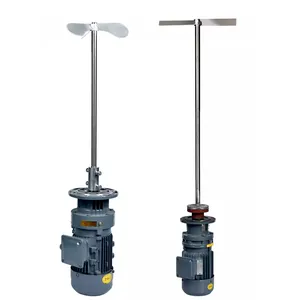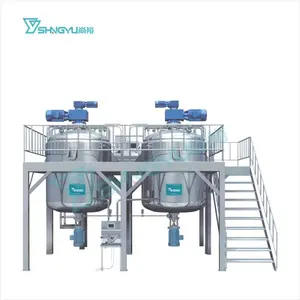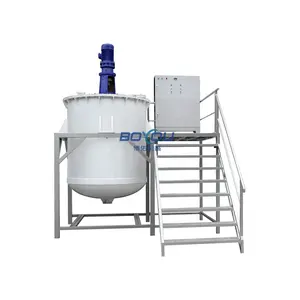(28619 products available)















































































































































































































































A liquid fertilizer mixer is a machine used to mix various raw materials and additives to prepare liquid fertilizers. Liquid fertilizer mixers come in different types, each suitable for different needs and applications.
Vertical mixers mix liquid fertilizers using the vertical screw. They have a cylindrical container, a vertical screw, and a motor. The vertical screw rotates slowly, mixing the materials efficiently. These mixers are easy to use and clean since they don't have complex parts. They are commonly used in small-scale agricultural settings and greenhouses.
Horizontal mixers mix liquid fertilizers using a horizontal shaft. They have a long, horizontally placed cylinder, a shaft, and a motor. The shaft has a blade that rotates to mix the materials. Horizontal liquid fertilizer mixers work well with large-scale fertilizer production. They can produce large quantities of liquid fertilizers in a short period. However, they need professional operators since they have complex systems.
Static mixers are versatile mixers used to mix liquid fertilizers. They have a stationary spiral element inside a pipe. As materials pass through the pipe, the spiral element mixes them together. Static mixers are simple to operate and maintain. They don't need external power to work. Static mixers are used to mix liquid fertilizers in pipelines and continuous production lines.
Ribbon blenders have a U-shaped container and a helical ribbon. They mix liquid fertilizers by moving materials both radially and laterally. Ribbon blenders are ideal for mixing liquid fertilizers with low viscosity, solid particles, and high abrasiveness. They are mainly used in the production of compound liquid fertilizers.
Batch mixers mix liquid fertilizers in batches. They have a container, a rotating shaft, and a motor. The rotating shaft has blades that mix the materials. Batch mixers are available in various sizes to cater for different needs. They are used to mix liquid fertilizers in small-scale agricultural settings and industries.
Specification of a liquid fertilizer mixer is an integral part of its performance and functionality. Farmers or manufacturers looking to invest in a liquid fertilizer mixing equipment must be aware of the factors to consider when it comes to its specifications. Some of the specifications to consider include the type of mixer, the power and size of the mixer, the type of liquid fertilizer mixer used, and the capacity of the mixer. The type of mixer is an essential specification to consider when it comes to liquid mixers. Generally, there are three main types of mixers: the paddle mixer, the ribbon mixer, and the vertical mixer. All of these mixers have different mixing techniques and are used to mix different types of liquid fertilizers. Paddle mixers are usually used to mix wet and dry fertilizers, while ribbon mixers are used to mix powdered fertilizers. On the other hand, vertical mixers are used to mix liquid fertilizers.
The capacity of a liquid mixer refers to the maximum amount of liquid fertilizer it can handle and mix at a go. When choosing a mixer, manufacturers must keep in mind the capacity of the mixer. For large-scale manufacturing or farming, it is best to invest in a mixer with a large capacity. Generally, the capacity of liquid mixers is usually measured in liters or gallons. The power and size of the mixer are also important to consider. The size of the machine will directly affect its portability and storage. This means that if a machine is too large, it may not be easy to store or transport it. The power of the machine is also an important factor to consider. This will determine the amount of liquid fertilizer the machine can mix in a unit of time.
Like any other machine, a liquid mixer requires proper maintenance to ensure it functions properly and has a long lifespan. The machine should be cleaned after every use. Users should rinse it thoroughly with clean water to remove any residue that may be left behind. They should also inspect it for any signs of damage and wear and tear. If any part is damaged, the machine must be repaired by a professional. The electric components of the machine should be kept dry and away from water. Proper lubrication of moving parts is also necessary for the machine’s proper functioning.
Industrial liquid fertilizer mixers are utilized in various industries and applications where the homogenization and mixing of liquid fertilizers in commercial quantities is required. Farming and agriculture are the main areas where liquid fertilizer mixers are employed. It is not surprising that liquid fertilizer mixers are used in these areas, given that the main purpose of this machine is to mix and homogenize liquid fertilizers. These mixers are used in several farming practices and scenarios. The mixers are employed in industries that produce liquid fertilizer. They are specifically used to mix the various components used in making liquid fertilizer. Such components include micronutrients, nitrogen, potassium, and phosphorus, which are mixed in precise ratios to create the final product. The liquid fertilizer mixers are also used in agricultural settings to prepare custom liquid fertilizer blends. The mixers are used to mix different types of liquid fertilizers, such as compost teas, seaweed extracts, and fish emulsions, to create personalized fertilizers that meet the specific needs of crops.
Another scenario where liquid fertilizer mixers are used is during pre-application mixing. Liquid fertilizers are mixed with other substances such as pesticides, herbicides, and growth regulators before being applied to crops. Liquid fertilizer mixers are used to combine these substances into a homogeneous mixture that can be easily applied. Liquid fertilizer mixers are also used to condition and homogenize liquid fertilizers stored in tanks or containers. The mixing process helps prevent settling and ensures that the entire liquid fertilizer has the same nutrient content. Liquid fertilizer mixers are also used to correct nutrient deficiencies in crops by adjusting the formulation of liquid fertilizers to meet the specific needs of the crops. The liquid mixers are also used to prepare soil for the planting of crops. In some cases, liquid fertilizers are mixed with soil conditioners and amendments to improve soil quality and provide essential nutrients to the growing crops.
When looking to purchase a liquid fertilizer mixer, it is important to consider the intended purpose and the features of the machine. Business buyers should evaluate the intended purpose of the mixer. They should consider the type of liquid fertilizer to be mixed, the required mixing capacity, and the frequency of usage. This will help them choose a mixer that meets their specific needs. Business buyers should consider the different types of mixers available and choose one that offers the desired level of efficiency and productivity. They should also consider the mixer's features, such as the mixing mechanism, speed control, and mixing time, and ensure they are suitable for their application. Additionally, business buyers should consider the compatibility of the mixer with other equipment, such as storage tanks and dispensing systems, and ensure seamless integration.
Business buyers should also consider the quality and durability of the machine. They should look for a well-constructed mixer that can withstand frequent use and maintain performance over time. They should also consider the material of the mixer and ensure it can withstand the type of liquid fertilizer to be mixed. When purchasing a liquid fertilizer mixer, business buyers should also consider the operating and maintenance requirements. They should ensure that the mixer is easy to operate and maintain to streamline the workflow and minimize downtime.
Business buyers should also consider the safety features of the machine. They should ensure the mixer has safety guards and emergency stop buttons to protect users from accidents. Also, they should ensure the mixer complies with relevant safety standards.
Is it profitable to invest in a liquid fertilizer mixer?
Investing in a liquid fertilizer mixer can be profitable for businesses involved in the agriculture industry. This type of mixer is essential for manufacturing liquid fertilizers, which are increasingly in demand by farmers. Also, the mixer can be used to mix other liquid farm products like pre-emergence herbicides, micronutrients, growth stimulants, and pesticides to make custom blends.
How can one choose the right liquid fertilizer mixer?
When choosing a liquid fertilizer mixer, it is important to consider the purpose of the mixer, capacity, type, and quality of the material to be mixed. If the mixer is for industrial use, consider the type of material to be mixed and choose a mixer that can handle the viscosity and density of the liquid. Also, make sure the capacity of the mixer meets the production demand. The mixer's quality is also important, so look for a durable liquid mixer that is well constructed.
How can one ensure the safety of the liquid fertilizer mixer?
Generally, liquid fertilizer mixers are designed with safety features to ensure user safety. These can include safety interlocks, overload protection, emergency stops, and guards on moving parts to prevent accidental contact. It is important to read the safety manual and follow all the operating instructions. Regular maintenance and inspection of the mixer are also important to ensure it remains safe to use.
What are the benefits of using liquid fertilizers?
One major benefit of liquid fertilizers is that they are easily and quickly absorbed by plants, making them suitable for foliar feeding. They are also evenly distributed when applied to crops. This leads to uniform growth and quality of the plant. Additionally, liquid fertilizers are readily available and can be used to correct nutrient deficiencies in crops. Farmers can also use them to improve the overall health and productivity of the plant.